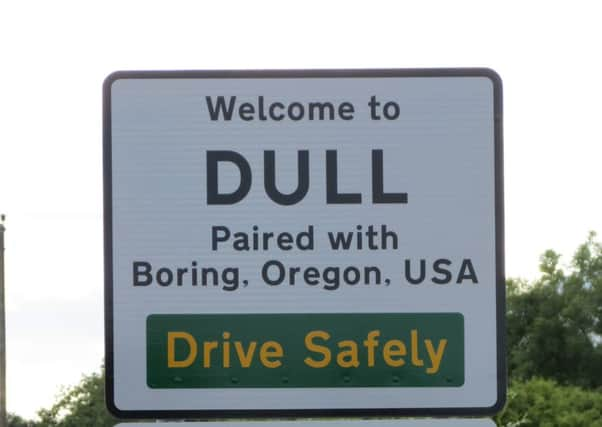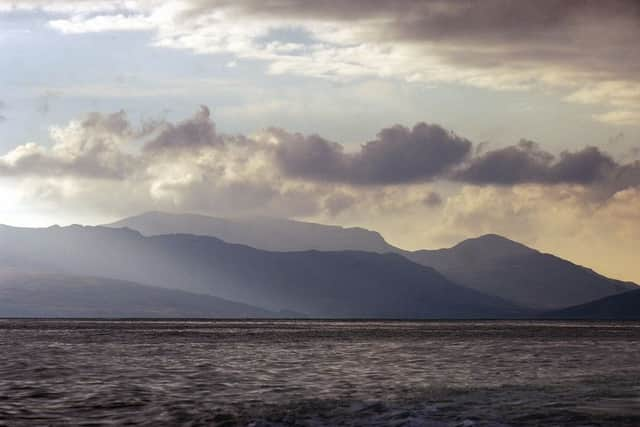Seven odd Scottish place names and their origins


Brokenwind
Brokenwind was a farm settlement near Kinmudy in 19th Century Aberdeenshire but its origins are unlikely to be linked to a bodily function.
Its name evolved over several decades having earlier been listed as Brokenwine and Brocken Weind.


Advertisement
Hide AdAdvertisement
Hide AdSimon Taylor, of the Scottish Place-Name Society, said: “Both elements are uncertain, but one thing is clear - it was not originally coined as a name meaning ‘broken wind’.
Hell’s Kitchen and Hothole
Hell’s Kitchen near Dunfermline in Fife was described in the late 1700s as small row of collier’s houses in bad repair which belonged to the Halbeath & Cuttlehill Colliery Company.
According to records “it arose from being the abode of unruly people” but it is also believed both Hell’s Kitchen and Hothole refer to the shallow coal mines in the area which would often catch fire. Neither place now exists.


Rum
The name of this Inner Hebridean island is derived from the Gaelic for “isle of the ridge “ but there have also been suggestions it is Old Norse for “wide island”.
Throughout much of the 20th Century, the island would appear as Rhum on maps due to the name being altered by former owner Sir George Bullough.
It is said that Sir George, described as the “playboy heir” to the island, did not want to be referred to as Laird of Rum.
Hell and Purgatory
The rather forboding names of Hell and Purgatory were given to farms in Sanday, Orkney with farmers routinely giving such names to hard-to-work land.
Advertisement
Hide AdAdvertisement
Hide AdThere have also been claims that the cottages were built by shipwrecked sailors, but little hard proof explains the origins of the names.
There are two places called Purgatory in Orkney, the second being in Birsay in the north.
Hell and Purgatory are widely referenced in The Hogboon and Hell, a popular island myth. It references the Cursitter family, who are known to have lived on the farms.
It says the farm, originally called Helye, was renamed Hell after a string of poor luck which local legend linked to the work of a hogboon - or earth goblin - who slept in a mound nearby.
The Cursitter family blamed a series of mishaps, such as spilt grain, missing eggs and leaking milk pails, on the hogboon as it awoke from hibernation.
The story goes that, in exasperation one night, Robbie Cursitter told his family: “I chose to keep the name Helye but now it shall be Hell, for that’s what it is.”
His son Jim had wanted to call his stony ground the same, but settled on the name of Purgatory.
Advertisement
Hide AdAdvertisement
Hide AdMr Taylor said there were many grimly humorous place names which had bee coined across Scotland which usually referred to poor land or difficult terrain.
Dull
This Perthshire village became a global star after it was twinned with Boring in Oregon.
According to the SPNS, The name Dull was coined over 1,000 years ago, probably in Pictish. The modern Gaelic work is dail, which means water meadow or low land by a river.
Another recorded theory is that Dull took its name from the burial site of St Adamnan, the Patron Saint of Glen Lyon
Later in life, it is said St Adamnan was asked by locals where he would like to be buried. He said on the spot where the first strap - or withy - of his coffin snapped as it was transported through the Glen.
He fell at the spot now known as Dull, the theory goes, with the place name linked to Gaelic word dul, or snare.
Muttonhall
Muttonhall near Kirkcaldy appeared on maps until the 1960s and is a good example of locals having a poke at pretention by twinning an ordinary word such as mutton with hall, which typically alluded to a high-status residence or building.
Advertisement
Hide AdAdvertisement
Hide AdOther examples in Fife include Cabbagehall near Leven but another theory of its origin also exists. Here, it is said that a tailor bought the property with his ‘cabbage of cloth’ - or the scraps of material left over from cutting of patterns.
Mr Taylor said pinning the word ‘hall’ to a place name was particularly common in Fife and other lowland areas.
He said: “It is often used ironically with a specific element which obviously undermines or subverts its high status pretention.”
Coup-my-Horn
Also in Fife, Coup-My-Horn is derived from tipping a horn to have drink. According to the Fife Place Name data site, the name was perhaps applied humorously to a settlement where the occupants were especially partial to taking a drink. There is also a local tradition that the name was connected with royal hunting parties from Falkland.
DOWNLOAD THE SCOTSMAN APP ON ITUNES OR GOOGLE PLAY
